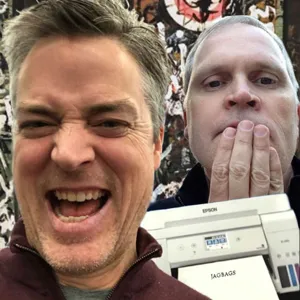1979 - February: “Saturday Night Fever” Soundtrack

OK, it isn't rock music, but the Soundtrack to "Saturday Night Fever" was a tremendously successful album both commercially and critically, and it had a major impact in popular culture of the later 70's. The theatrical release of the movie actually went back to December of 1977, but it was the winner of the Grammy Award for Album of the Year in February 1979, one of only three soundtrack albums to do so. Composed by the Bee Gees and prominently featuring that band, this soundtrack is the second-best selling of all time behind "The Bodyguard."
The Bee Gees actually didn't get involved with the film until it was in post-production. John Travolta was dancing to Stevie Wonder and Boz Scaggs when the scenes were filmed. Columbia Records refused legal clearance for Scaggs material because they were pursuing another disco movie at the time, and the Bee Gees were commissioned to write the songs for the film. The brothers Gibb wrote the songs primarily in a single weekend.
The resulting success would change the trajectory of both the Bee Gees and actor John Travolta. The Bee Gees would become a group often compared to the Beatles in the late 70's. Travolta, already well known for his role in the television series "Welcome Back, Kotter," would become an A-list celebrity and a household name.
In 2013 the album was added to the National Recording Registry in the Library of Congress for preservation.
Lynch is responsible for this travesty, as the other participants do so under protest. Support your local rock band, folks!
Night Fever
This song was originally called "Saturday Night," but Robin Gibb was concerned about that name because of the number of songs already bearing the name. "Night Fever" was inspired by Percy Faith's "Theme from 'A Summer Place'", and it spent 8 weeks at the top of the Billboard charts.
How Deep Is Your Love
This pop ballad was released in September of 1977, ahead of the movie. It had hit the top of the Billboard Hot 100 by Christmas Day of 1977, remained there for 3 weeks, and spent 17 total weeks in the top 10. Barry Gibb has commented that this is his favorite Bee Gees song. It won Best Pop Performance by a Group at the February 1978 Grammy awards.
You Should Be Dancing
Prior to their involvement with the "Saturday Night Fever" soundtrack, the Bee Gees first released this track on their album "Children of the World" in 1976. This is the song playing when Travolta takes over the disco dance floor.
Jive Talkin'
Here is another song that had been previously issued before the soundtrack was released. The lead single from the album "Main Course" was released in May 1975, long before "Saturday Night Fever." The song was originally called "Drive Talking," and the rhythm was inspired by the sound the band's car made crossing the Julia Tuttle Causeway as they traveled to the studio in Miami.
ENTERTAINMENT TRACK:
Dancing Queen by ABBA
A mockumentary called "ABBA: The Movie" was in the theatres at this time in the U.S.
STAFF PICKS:
Is She Really Going Out with Him by Joe Jackson
Wayne gets the staff picks going with a song that asks why good looking women date horrible men. Joe Jackson is often confused with Elvis Costello, another artist releasing albums at the time. This is Jackson's debut single from his debut album, "Look Sharp."
The Gambler by Kenny Rogers
Bruce brings us Kenny Roger's signature song. Songwriter Don Schlitz wrote this song in 1976 and it was recorded by several musicians including Johnny Cash before Rogers took it to number 1 on the country charts and number 16 on the Billboard Hot 100. The gambler looks through life through the lens of poker, knowing "every hand's a winner, and every hand's a loser," and of course "you've got to know then to hold 'em, know when to fold 'em."
Stumblin' In by Chris Norman and Suzi Quatro
Rob's staff pick is the sole top 40 hit by female rock pioneer Suzi Quatro, and Norman's only hit outside of his previous band, Smokie. This duet made it to number 4 on the Billboard Hot 100. Both singers have a smoky vocal sound.
Do You Think I'm Sexy? by Rod Stewart
Lynch notes Stewart's ability to surf the waves of popularity with this staff pick. While Rod Stewart honed his craft in the rock genre, he achieved both popularity and notoriety with his polarizing choice of embracing disco music in the late 70's. Today this song remains one of his most popular tunes.
INSTRUMENTAL TRACK:
Pegasus by The Allman Brothers Band
The Allman Brothers were decidedly NOT a disco band in this instrumental jam.
Thanks for listening to “What the Riff?!?”
NOTE: To adjust the loudness of the music or voices, you may adjust the balance on your device. VOICES are stronger in the LEFT channel, and MUSIC is stronger on the RIGHT channel.
Please follow us on Facebook https://www.facebook.com/whattheriffpodcast/, and message or email us with what you'd like to hear, what you think of the show, and any rock worthy memes we can share.
Of course we'd love for you to rate the show in your podcast platform!
**NOTE: What the Riff?!? does not own the rights to any of these songs and we neither sell, nor profit from them. We share them so you can learn about them and purchase them for your own collections.














